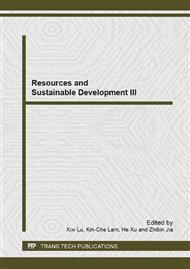p.1722
p.1726
p.1733
p.1737
p.1741
p.1746
p.1753
p.1757
p.1762
German Energiewende and its Implications for China
Abstract:
Germany’s strategic choice of Energiewende is closely related to its specific political, historical, economic and energy resource backgrounds. Renewable Energy has long been the core element of German Energiewende. Boosted by favorable incentive policies, renewable energies such as wind power and PV installations has experienced a rapid growth in the last decades. But the rapid expansion of renewable energies also leads to skyrocketing cost for electricity consumers, grid incapability of integrating large scale distributed generators and insufficiency of generating capacity. To cope with these problems, the federal government is considering a thorough revision of its policy framework for renewable energies. The key idea is that, the development goal should be set more rationally, more attention should be attached to economic affordability, and capacity market should be considered in the medium term to ensure reliable operation of power system.
Info:
Periodical:
Pages:
1741-1745
Citation:
Online since:
June 2014
Authors:
Keywords:
Price:
Сopyright:
© 2014 Trans Tech Publications Ltd. All Rights Reserved
Share:
Citation:


